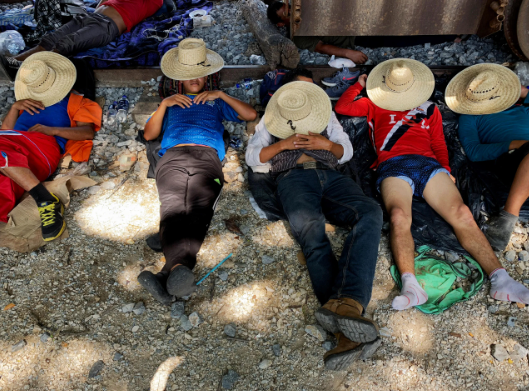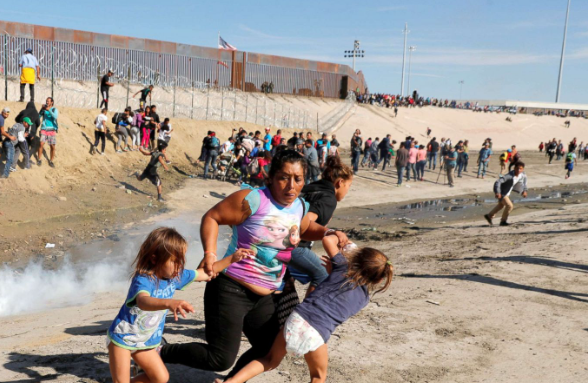A Humanitarian Crisis Unfolds In recent days, hundreds of migrants have made their way toward the United States border, driven by a mix of hope and desperation. This surge is largely attributed to the anticipation and anxiety surrounding the reinstatement of certain Trump-era immigration policies. As these migrants embark on perilous journeys, the humanitarian and political dimensions of the crisis come into sharp focus. This article explores the factors contributing to the current situation, the experiences of the migrants, and the broader implications for U.S. immigration policy.
A Humanitarian Crisis Unfolds
Reinstatement of Trump-Era Policies
One of the primary drivers behind the recent surge in migrant movement is the expectation of the reinstatement of stringent immigration policies from the Trump administration. These policies, which include stricter border controls and expedited deportations, have created a sense of urgency among migrants who fear that their window of opportunity to seek asylum or better opportunities in the U.S. might be closing. 
Economic and Political Instability
In addition to the looming policy changes, ongoing economic and political instability in many Latin American countries is forcing people to flee their homes. Nations like Honduras, El Salvador, and Guatemala are grappling with high levels of violence, poverty, and corruption, which leave many with little choice but to seek safety and a better life elsewhere.
Impact of COVID-19
The COVID-19 pandemic has exacerbated the hardships faced by many in Latin America. Economic downturns, loss of jobs, and inadequate healthcare systems have pushed more people to consider migration as their only viable option. The pandemic has also complicated travel and border crossings, adding layers of difficulty and danger to the journeys of migrants.
A Humanitarian Crisis Unfolds
The Journey North
For many migrants, the journey to the U.S. border is fraught with peril. They face numerous challenges, including harsh weather conditions, treacherous terrain, and the constant threat of violence from criminal gangs and human traffickers. Despite these dangers, the hope for a better future drives them forward.
Encounters with Authorities
Upon reaching the border, migrants often encounter U.S. Border Patrol agents. The process of seeking asylum can be long and arduous, with many being placed in detention facilities while their cases are processed. Conditions in these facilities have been a subject of intense scrutiny and criticism, with reports of overcrowding, inadequate medical care, and poor living conditions.
Human Stories
Behind the statistics are countless human stories of hardship, resilience, and hope. Families travel together, carrying the few belongings they can manage. Children, in particular, face significant risks and hardships. Many migrants have left behind everything they know in search of safety and a chance at a better life, hoping that the sacrifices they make today will lead to a brighter future for their children.
Broader Implications for U.S. Immigration Policy
Policy Debates and Challenges
The current surge in migrant movement has reignited debates over U.S. immigration policy. The Biden administration faces the difficult task of balancing humanitarian concerns with the need for secure borders. The reinstatement of Trump-era policies has been met with criticism from human rights advocates who argue that these measures are inhumane and ineffective in addressing the root causes of migration.
Legal and Humanitarian Considerations
U.S. A Humanitarian Crisis Unfolds immigration law and international human rights obligations require careful consideration in the formulation of policies. The right to seek asylum is a cornerstone of international law, and any measures that infringe upon this right must be scrutinized. The administration is under pressure to find solutions that protect the rights of migrants while maintaining border security.
Long-Term Solutions
Addressing the A Humanitarian Crisis Unfolds root causes of migration requires a multifaceted approach. Long-term solutions involve tackling the economic, social, and political factors that drive people to flee their homes. This includes international cooperation and aid to improve conditions in the migrants’ home countries, as well as comprehensive immigration reform in the U.S. that provides clear and fair pathways for legal immigration.
Voices from the Ground
Migrant Advocates
A Humanitarian Crisis Unfolds Migrant advocates and organizations on the ground play a crucial role in providing support and advocating for the rights of migrants. These groups offer legal assistance, humanitarian aid, and raise awareness about the challenges faced by migrants. Their work is essential in ensuring that the voices of migrants are heard and that their rights are protected.
Government and Law Enforcement
Government officials and law enforcement agencies are also key A Humanitarian Crisis Unfolds players in this crisis. Their actions and policies have a direct impact on the lives of migrants. Ensuring that these authorities act in accordance with the law and respect human rights is essential for addressing the humanitarian aspects of the crisis.
Public Opinion
Public opinion in the U.S. is divided on the issue of immigration. While some support stricter border controls, others advocate for more compassionate and comprehensive immigration policies. The current situation at the border is likely to influence public attitudes and could play a significant role in shaping future immigration policies.
The Path Forward
Immediate Actions
In the short term,A Humanitarian Crisis Unfolds the Biden administration faces the challenge of managing the current surge in migrants. This includes ensuring that the border facilities are equipped to handle the influx, providing adequate humanitarian aid, and processing asylum claims in a timely manner. Clear communication and coordination with international partners are also essential.
Long-Term Strategies
Long-term strategies must address the underlying causes of migration and create a fair and efficient immigration system. This involves investment in the development of Latin American countries, support for democratic governance and the rule of law, and the establishment of legal pathways for migration. Comprehensive immigration reform in the U.S. is also crucial for creating a system that is just and effective.
Building Consensus
Achieving lasting solutions will require building consensus across political and social divides. This means engaging with stakeholders from all sides of the debate, including government officials, migrant advocates, law enforcement, and the public. Open dialogue and a commitment to finding common ground are essential for addressing the complex and multifaceted nature of the immigration crisis.
Conclusion
The movement of hundreds of migrants towards the U.S. border in response to anticipated policy changes highlights the urgent need for a comprehensive and humane approach to immigration. The experiences of these migrants, coupled with the broader implications for U.S. policy, underscore the complexity of the issue. As the Biden administration navigates this crisis, the focus must remain on protecting human rights, ensuring security, and addressing the root causes of migration.
In the face of this humanitarian challenge, the actions taken today will shape the future of countless lives. By fostering dialogue, seeking long-term solutions, and prioritizing compassion and justice, it is possible to create an immigration system that reflects the values and aspirations of a nation built on the promise of opportunity and refuge for all. ALSO READ:- Harris Hails Joe Biden’s ‘Unmatched’ Legacy as Party Endorsements Pile Up: A Reflectionon Leadership and Unity 2024






29305 windshield crack repair
29304 front windshield replacement
auto glass discount 29306
29302 windshield crack repair
auto glass shop 29303
This made a real impact on me — thank you!
You’ve turned content into an experience — amazing job!
You’ve taken this topic to a whole new level — amazing!
Such a dynamic and exciting piece — I’m impressed!
Your energy transformed my mood instantly — thank you!